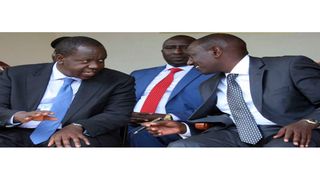
Deputy President William Ruto talking to Interior Cabinet Secretary Fred Matiang'i during a past function in Nairobi.
| Evans Habil | Nation Media GroupNews
Premium
Matiang’i plots more Ruto, VIPs police changes
Interior Cabinet Secretary, Fred Matiang’i, is not done yet with overhauling deputy president William Ruto’s security detail.
Dr Matiang’i has, in proposed amendments, cast his net wider and now wants to change the entire legal structure governing the protection of senior government officials, Members of Parliament and other individual recognised by the State as Very Important Persons (VIPs).
Details of the proposed law were revealed on Wednesday as a closed-door session between CS Matiang’i and the National Assembly Committee on Security and National Administration.
If adopted by Parliament, the changes will see the number of police officers deployed to guard the holder of the Office of the Deputy President capped at 30.
The security detail of other State VIPs will also be cut to size, as the Ministry of Interior moves to instill order into the perceived chaotic management of VIPs protection service.
In the wake of the fallout caused by changes in DP Ruto’s security detail, the Ministry now says the deployment of bodyguards should be regulated by law to avoid the abuse of discretion that has seen some public officers allocated more officers than they deserve.
The parliamentary security committee, which is chaired by Lari MP Peter Mwanthi, reportedly supported Dr Matiang’i’s proposals and mandated the Ministry to complete drafting the Bill as a matter of urgency.
Dr Matiang’i on Wednesday told MPs that DP Ruto is guarded by a brigade of 257 police officers who are also stationed at his homes and vast business empire at a time when the country is facing serious security challenges and shortage of security personnel.
The Ministry officials had asked the Committee to take charge of developing the proposed Bill, but the MPs turned down the request arguing that the Ministry, which is the custodian of the country’s security needs, is best placed to do so.
“There is an urgent need for the law and the Ministry is best placed to develop it because it has personnel who understand the subject matter,” Mr Mwanthi told the Nation yesterday.
“We want the Ministry to develop the law because it has the service commanders who understand how best to deal with the issue of security and VIP protection,” he added.
“The matter is very urgent. We want the Bill in the next two to three weeks. Let them develop it and bring it to us so that we can interrogate it and see whether we can add, subtract or adopt it because what is obtaining for now cannot be allowed to go on.”
The proposal on the statutory intervention on the issue of VIPs’ protection was the key talking point of the CS’s submission when Dr Matiang’i appeared before the Committee to brief the legislators on the controversial security changes around DP Ruto that were effected last week by Inspector General Hillary Mutyambai.
Besides capping the number security detail due to the holder of the Office of Deputy President at 30, the Ministry also wants the bodyguards allocated to cabinet secretaries and Parliamentary leadership – Majority leaders and whips - capped at four police officers while MPs and constitutional office holders should get one security officer each.
However, the Ministry proposes consultations between the three arms of government to determine the security needs of both the holder of the office of the Chief Justice and the two Speakers of parliament to ensure that the amendments in the Bill capture the needs of all stakeholders.
Dr Matiangi on Wednesday told the Committee that DP Ruto remains one of the best protected holders of that office, discounting claims that the recent shakeup had exposed the security of the country’s second in command.
He accused the DP of misusing the elite officers deployed to guard him, telling the committee that Mr Ruto has on several instances re-deployed some of the presidential guards at his disposal to protect some undeserving individuals and people considered to have “criminal” records.
Among those fingered are MPs Aisha Jumwa and Oscar Sudi who wrongly enjoy the protection of presidential escort deployed to them by the DP.
Statistics he submitted to the Committee show that his 11 predecessors were on average guarded by 24 police officers, and the Ministry believes the number provides the necessary reference point that the government can use in future planning.
Kenya’s first Vice President Jaramogi was protected by 30 officers, Joseph Murumbi had 22, Daniel arap Moi 34, Mwai Kibaki 26, Josephat Karanja 22, George Saitoti (30), Musalia Mudavadi (22), Kijana Wamalwa 22, Moody Awori (22) and Kalonzo Musyoka 26.
The Ministry also wants the law to be clear cut that no police officer would be allowed to provide round-the-clock security to private premises of any public officer, except the President.
“You must enact one that will limit the numbers due to every eligible State officer because the current situation is not moral,” Dr Matiang’i told the Committee when the two sides held a session in camera on Wednesday.
The private session was held to give the CS the opportunity to explain the operational decision that led to last week’s re-arrangement of security at DP Ruto’s residences around the country.
In the re-arrangement of DP’s security announced last week, the Inspector General of Police Hillary Mutyambai triggered a political storm when he removed the General Service Unit (GSU) from guarding Mr Ruto’s residences and properties and replaced them with officers from the Security of Government Building (SGB), an elite squad drawn from the Administration Police Service (APS), which is trained to guard Critical Infrastructure and Vital Installations.





